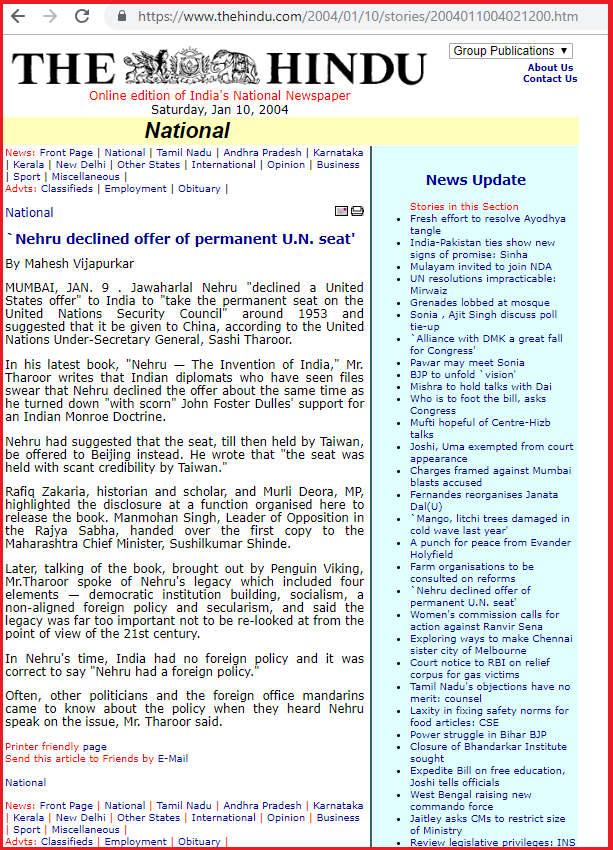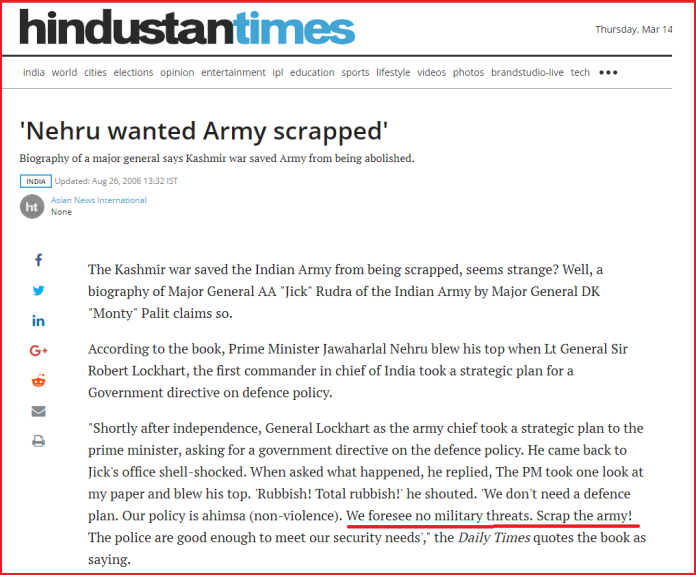And yet again. At the Security Council, the Chinese veto stops the UN from declaring Masood Azhar a global terrorist.
There are two hard truths here
(1) China does not like India. This is not surprising. The Chinese feel they are entitled to dominate the world and at the very least, Asia. The last thing they want is for India to become a global power. It’s not surprising.
(2) China is a much more powerful country than India. Their economy is much, much larger than ours. In terms of global trade footprint, they are far ahead. Their military is quite a bit larger than ours. And so is their impact on science and technology.
And so it is that China will keep doing everything in their power to keep tripping India up. Which is a lot, because China is very powerful.
But how did such a yawning power differential arise between two Asian countries that began roughly from the same point at the end of World War 2?
India had been plundered for 200 years by the British Empire. The Chinese were a nation in ruins as well, where World War, Japanese aggression and Civil War had all happened almost at the same time.
How did the power trajectories of the two nations turn out to be so different? There are three reasons.
Congress, Congress and Congress.
Here is a simple illustration.

As (then UN Under-Secretary General) Shashi Tharoor wrote, India declined the US offer of a permanent seat in the Security Council around 1953 and suggested instead that the seat is offered to China. The same Security Council where China used to its veto to humiliate India today.
Over sixty-five years later, Nehru may seem like a soft target. But the penalty for some blunders lingers “forever”. The UN Security Council has not changed since the People’s Republic of China joined. The world may have changed … few would argue today that Britain or France are among the world’s five most powerful countries while Japan, Germany, India and Brazil are excluded. But the legacy of 1945 at the UN Security Council endures … and hasn’t changed one bit since.
We are still paying for Nehru chasing a mirage of “Asian solidarity” with a soft spot for Communism. This is from Nehru’s Presidential Address to the Lucknow session of the Congress in 1936:

Saying that the future is “full of hope” because of the Soviet Union and looking to their genius of Communism to put an end to the “wars and conflicts which capitalism feeds”. This despite watching Stalin’s purges unfold. Pick up a copy of Nehru’s Discovery of India and read it. Among all his other cheerleading of the USSR, Nehru actually suggests that the Soviet Union has discovered the secret to keeping disparate regional identities under a common umbrella, something that he sees as a model for India.
Now tell me how many pieces the Soviet Union broke into? Some visionary….
Such longing for Communism left Nehru with a natural affinity for ‘Communist’ China. The Chinese, of course, was more clever… they understood that Asian giants India and China were headed on a collision course.
Nehru’s other childish belief in “peace” had led to deliberate neglect of the Indian Army. What else do you call somebody who thought that India should move to disband its military?

‘Foresee no military threats … scrap the army.” Some visionary.
The British Indian Army had served with distinction in both World Wars. It had the discipline, training, experience and equipment that by far exceeded anything that the ragtag Chinese Red Army had. It would have taken monumental neglect of the Indian Army in the Nehru years for the humiliation of 1962 to happen.
But 1962 was also a very long time ago. What explains the power differential today?
The *real* damage to India happened at a much deeper level. Can you imagine the first decade after independence? The zeal with which we could have started building a new prosperous India.
It didn’t happen. For 40 years, all the way till 1991, India kept following the disastrous path of Nehruvian socialism. We did not give up till the very end, right until we went bankrupt in 1991.
Incidentally, ‘historians’ would have us believe that Manmohan Singh was a ‘reformer’. Dr. Singh had been embedded in the Nehruvian socialist establishment since 1971, served as everything from Chief Economic Adviser to Finance Ministry to RBI Governor. Again, ‘historians’ would have us believe that Dr Singh kept his reformist self hidden closely under wraps as he was showered with favours by the ruling Nehru-Gandhis for 2 decades.
Such ‘honesty’. I am a fan.
The Chinese got wiser much before we did. By 1979, they junked Communism and began running a race for world domination.
The Chinese got a huge headstart before India even before India started moving. And even when India began, we moved slowly… very very slowly. After all, India is a democracy. Nehruvian socialism had been drilled into Indians for 40 years, every textbook, every newspaper, every teacher and every intellectual had said the same thing: Nehruvian socialism good.
In a democracy, there’s always an election coming. The long shadow of 40 years of brainwashing takes forever to lift. It cannot happen overnight in response to a panic-stricken call from the top.
By the time Indians were waking up and rubbing their eyes, China had been running hard for 12 years. Not surprisingly, many wanted to go back to sleep. After all, every book and every newspaper had told them that Nehruvian socialism was a good thing. Even today, Indians remain susceptible to the rhetoric of Nehruvian socialism.
Vajpayee took some bold steps in 1999-2004. He paid an electoral price for it. It is safe to say that Modi always has the 2004 experience at the back of his mind. Both the UPA and the NDA are terrified of being called “anti-poor”. The greatest irony, of course, is that no system in the world has lifted as many people out of poverty than capitalism. But people of India have been told that capitalism is “anti-poor”, the well has been poisoned for generations.
Time moves quickly but also very slowly. PM Modi was born on Sept 17, 1950, a few months after India officially became a Republic. Did you know that he is the first Prime Minister to be born after India was already a sovereign republic?
The past has a very long shadow indeed. India saw forty years of darkness after independence. If you want to understand what I am saying, imagine a baby born in a dark room and kept there for 40 years. Then, the door of the room is opened slightly and the now 40-year-old person sees the sunlight for the first time. Indeed, this is the first time they will try to walk on their own legs.
It will take a while to catch up.



